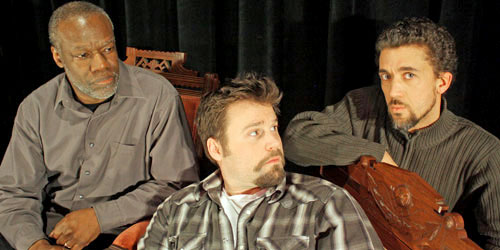By Judith Cookis Rubens

Rico Bruce Wade, Benjamin Reigel and Scott Norman in "The Whipping Man." Photo: Farmers Alley Theatre
Audiences might think they know many Civil War-era stories, but playwright Matthew Lopez's "The Whipping Man" adds one more dynamic tale to the list.
Farmers Alley's forceful, thought-provoking, three-man drama will leave you with even more questions about our country's painful history. But it does so with artful flourish and small, poignant details of one fictionalized family's past.
It's 1865 and the Civil War has just ended, the Confederacy falling just days earlier. Injured Jewish Confederate officer Caleb DeLeon returns to his family's once-grand plantation home in Richmond, Va., only to find it in ruins and his family gone.
Left are two of the family's newly freed slaves: Simon, a faithful, humble elder who knows all the DeLeon family secrets; and John, a wild, law-breaking cad who wants revenge after years of servitude.
All three have their secret reasons for holing up in the crumbling mansion. Outwardly, they are protecting it from looters until the DeLeons return. But, really, they are protecting their own interests and secrets, which only adds to the suspense.
The men clearly need each other, and, indeed, they've been "family" for years, but they circle each other warily, no one knowing his role anymore. When Caleb's wounded leg, rotting from gangrene, needs to come off, Simon (a war nurse of sorts) saves Caleb's life and plies his former master with stolen whiskey to ease the pain. But Caleb can't stop himself from ordering Simon and John around, as if they are still his property.
Interestingly, John and Caleb grew up together ("two peas in a pod," Simon recalls). But John, understandably, harbors deep resentment over the many times Caleb's father punished John by sending him to the local "whipping man," a brutish devil with a massive collection of bullwhips.
Further complicating things is the fact that the three men are bound by their shared faith of Judaism. The elder DeLeon passed on his Jewish faith to his slaves. To Simon, that faith has been a gift he's clung to in times of sorrow.
But, as the two African-American men recount, it's also tough for them to square their treatment as enslaved men in the Old South at the hands of a Jewish family whose own ancestors endured persecution and slavery.
It's a novel conceit (African-American Jews in the postbellum south? According to history, there were some), and one that adds interesting complications.
The second-act Passover Seder scene is especially powerful as the trio commemorates the freedom of Jews from slavery in Egypt. A reluctant Caleb joins in, having abandoned his faith after seeing the horrors of war. Simon, the family's new moral compass, flips back and forth between memorized passages of the Jewish Haggadah to singing verses of the African-American spiritual, "Go Down, Moses," further cementing the parallels between both enslaved groups.
What does it mean to be a family? Is it strictly blood, genes? Or do shared rituals and faith have a part? Can there be love with ownership?
We don't get simple answers, but director D. Terry Williams' masterful interpretation of this taut two-act play offers surprises up until the very end.
W. Douglas Blickle's charred, decaying home set is rich with period details, while sound designer Derek Mechinger gets it just right with the ominous, relentless rain just outside the front door. The gauzy lighting designed by David Downey is well-executed and bathes everything in the filmy veil of history.
But it would all be nothing without a stellar trio of actors who deliver multi-layered characters. The obvious leader is Rico Bruce Wade as the quietly moral but steely Simon. Wade captures Simon's hopeful optimism and humor, along with his weariness. He lends perfectly timed humor and great energy to every scene.
As John, Scott V. Norman reprises the role he played in 2011's joint production by Plowshares Theatre Company and The Jewish Ensemble Theatre Company in Metro Detroit. He menacingly pulls on John's cloak of resentment and anger, but Norman also excels at unearthing the wounded childhood pain beneath.
Ben Reigel's Caleb is (spoiler alert) injured and couch-ridden for most of the play, and, therefore, stripped of much physical acting. Somehow he manages to bring great depth to this pivotal character using voice, timing and facial expressions. Reigel's achingly beautiful reading of Caleb's wartime letters further humanizes his character.
As Simon so powerfully explains to John, everyone has choices. Some of these choices turn out to be bad, but they are all within our power.
One easy choice, however, is catching "The Whipping Man" at Farmers Alley before it closes.
REVIEW:
'The Whipping Man'
Farmers Alley Theatre, 221 Farmers Alley, Kalamazoo. 8 p.m. Thursday-Saturday & 3 p.m. Sunday through Feb. 24. 2 hours (with intermission). $23-27. 269-343-2727. http://www.FarmersAlleyTheatre.com










